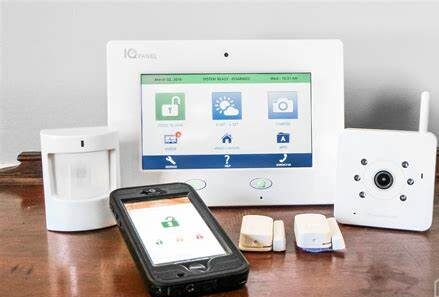Homeowners often invest in home security systems to protect their property, but a common question arises: Does homeowners insurance cover home security systems? While home security systems can reduce risks, insurance coverage for these systems can vary. In this guide, we’ll clarify what homeowners insurance typically covers, how security systems can influence insurance, and tips for maximizing potential discounts.
Table of Contents
ToggleWhat Homeowners Insurance Covers
Homeowners insurance generally protects your home and belongings from a range of perils, including fire, theft, and certain natural disasters. It typically includes:
- Dwelling Coverage: Protects the structure of your home from covered events.
- Personal Property Coverage: Covers your belongings, like furniture and electronics, against risks such as theft or fire.
- Liability Coverage: Covers legal costs if someone is injured on your property.
- Additional Living Expenses (ALE): Provides reimbursement for temporary living expenses if your home is uninhabitable after a covered event.
While standard policies cover damages from break-ins, the cost of installing and maintaining a security system typically isn’t included. However, the presence of a security system can help lower your premium, as it reduces the risk of theft or damage.
Does Homeowners Insurance Cover the Cost of Security Systems?
In general, homeowners insurance doesn’t directly cover the purchase, installation, or maintenance of a security system. These systems are considered optional enhancements for your home rather than necessary repairs or replacements.
However, insurance companies often recognize that security systems reduce risks, and many offer premium discounts if you install qualifying systems. This means that while the upfront costs are out-of-pocket, you may receive a reduced rate on your premium as a reward for improving your home’s security.
Common Security System Types and Coverage
Some insurance companies may cover specific types of loss-prevention devices, such as:
- Fire alarms and smoke detectors with monitoring capabilities.
- Water leak detection systems that can reduce the risk of water damage.
- Certain smart home systems that integrate security, temperature monitoring, and flood sensors.
If you’re considering installing any of these systems, check with your insurer about any discounts they offer or if they have requirements for specific types of devices.
How Home Security Systems Affect Insurance Premiums
The presence of a home security system often lowers the risk of burglary or damage, which can make your home less expensive to insure. Many insurance companies provide discounts ranging from 5% to 20% depending on the system type, quality, and monitoring level.
Factors That Impact the Discount
Several factors influence how much you can save with a security system:
- Type of System: Basic systems, like door and window sensors, may offer smaller discounts, while comprehensive systems with monitoring provide larger savings.
- Monitoring Services: Security systems monitored by professional services 24/7 often result in higher discounts compared to unmonitored systems.
- Integration with Smart Home Technology: Insurers may offer additional discounts for systems that integrate smoke detectors, water leak sensors, and cameras, as these can reduce various risks.
In addition to the discount, the peace of mind that comes with a security system can be invaluable. Reducing the chance of a break-in or damage may also prevent future claims, potentially keeping your insurance rates lower over time.
Types of Security Systems That Qualify for Insurance Discounts
When it comes to homeowners insurance, not all security systems qualify for a discount. The best options for insurance savings often include:
Monitored Security Systems
Systems that are professionally monitored by a security company, such as ADT, Vivint, or SimpliSafe, provide real-time alerts to both the homeowner and the security company. Monitored systems offer immediate response to incidents and are highly valued by insurance companies, often leading to the largest discounts.
Smart Home Security Systems
Smart home security systems, such as those offered by Google Nest, Ring, or Amazon Alexa, are popular for their flexibility and features. Systems that integrate motion sensors, smart locks, video doorbells, and cameras are highly effective in preventing theft and damage, which insurance companies may reward with discounts.
Fire and Water Detection Systems
Systems that go beyond just security and include fire, carbon monoxide, and water leak detectors also qualify for discounts. These additional features can help prevent fires, water damage, or other costly disasters, so insurance providers often consider them beneficial for overall risk reduction.
Video Surveillance
Cameras that monitor entrances, driveways, and key areas of the home can also lead to discounts. Video footage can assist with investigations and potentially deter burglars, making them a useful feature for homeowners and insurance companies alike.
Tips for Choosing the Right Home Security System for Insurance Benefits
When selecting a home security system, consider options that provide effective protection and maximize insurance savings. Here are some tips to help you choose:
Check with Your Insurer for Recommendations
Before purchasing a security system, ask your insurer about their discount policy and preferred systems. Some insurance companies partner with specific providers and may offer additional discounts for using certain systems.
Opt for 24/7 Monitoring
Monitored systems offer enhanced protection because they provide immediate alerts to local authorities or security personnel. Insurance companies view this as a high level of risk reduction, which usually translates to higher savings on your premium.
Prioritize Systems with Additional Safety Features
In addition to burglar alarms, look for systems that include smoke detectors, fire alarms, and leak sensors. These extra features help reduce various types of risks, and they often qualify for additional discounts.
Maintain Your Security System
To continue receiving your insurance discount, keep your security system well-maintained and update it as needed. Regular testing and maintenance ensure that it operates effectively, which is vital for both home security and maintaining eligibility for any insurance savings.
Look for Smart Technology Integration
Smart technology integration, such as mobile alerts, remote control, and real-time monitoring, adds convenience and improves safety. Many insurers offer greater discounts for homes with these technologies, as they allow for quicker response times and better prevention of accidents.
Conclusion
While homeowners insurance doesn’t directly cover the cost of installing a security system, having one can offer valuable benefits, including potential premium discounts. By choosing a monitored, comprehensive security system, you can not only protect your home but also reduce the costs of your homeowners insurance policy. For maximum savings, consult your insurance provider about preferred systems and potential discounts, and consider options with added features like fire or water detection to enhance your home’s overall security and safety.




